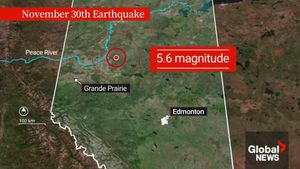The Arab world is facing a significant economic downturn, marked by rising poverty and crippling unemployment rates across various countries. Over the past 18 months, the economic stability of nations like Lebanon, Egypt, and Jordan has come under severe stress due to multiple compounding factors. Economists are sounding the alarm about the dire consequences for ordinary citizens.<\/p>
According to economist Alia Khoury, "The economic situation has deteriorated significantly, and many people are struggling to meet their basic needs." This warning reflects the ground reality for thousands of families caught between their daily struggles and the relentless tide of inflation sweeping through the region.
The downturn can be attributed to several key factors. Political instability, often punctuated by social unrest and conflicts, has plagued these nations for years. The repercussions of the COVID-19 pandemic have compounded these effects, crippling local businesses and disrupting trade routes. Global economic conditions, including supply chain disruptions and changing oil prices, have only added to the malaise.<\/p>
The stagnation of economic growth has had particularly harsh impacts on Lebanon. Once known for its vibrant economy, the country has seen its GDP shrink drastically, and many citizens now find themselves struggling with the rising cost of basic goods, primarily due to soaring inflation rates.
During this crisis, food prices have risen dramatically, leaving families to decide whether to fill their cupboards or pay for medical care. The statistics are staggering; food inflation has outpaced overall inflation rates, contributing significantly to the heightened levels of despair among the populace.
Neighboring Egypt is not faring any differently. The government has been grappling with skyrocketing debt levels and reduced foreign investment. Efforts to stabilize their economy have been impeded by internal disputes and the struggle to provide adequate services to its citizens.
Finance Minister Ahmed Sami has urged for immediate action, stating, "The government must take immediate action to stabilize the economy and help those affected." This call for action resonates deeply within circles of public discourse as many wonder what measures can be implemented to alleviate their suffering.
For countries like Jordan, which has relied heavily on foreign aid to sustain its economy, the picture is equally bleak. The global community is closely watching the dynamics at play, as international support dwindles amid shifting priorities across donor nations.
Rising tensions within the region due to various geopolitical conflicts have made it increasingly difficult for these nations to develop coherent strategies to combat the economic downturn. External debts are piling up, and the futures of these economies are uncertain as they stand on the brink.
The economic downturn is not just about numbers and statistics; it encompasses the lives of real people who are facing increasingly dire circumstances. Families are being torn apart by financial insecurity, and communities are feeling the strain of dwindling resources.
Measuring the full extent of the downturn is challenging, but its impacts are all too apparent. From academic institutions to governmental organizations, conversations surrounding economic reform are more pressing than ever. Citizens are demanding transparency and action from their leaders.
With so much at stake, it is clear the governments must reassess their strategies to tackle this multifaceted crisis. Policymakers need to commit to long-term solutions aimed at not only stabilizing but revitalizing their economies to create sustainable growth.
Time is of the essence, as the longer these countries wait to act, the greater the potential for social unrest and economic collapse. The stakes are high, and the need for decisive, impactful action could not be clearer as the world watches and waits.



